Vittorio Di Russo
Deported from Amsterdam to Milan, Vittorio Di Russo landed at Linate Airport on October 12, 1966. As he was a colorful character, the Corriere della Sera reporter who was assigned at the Milan Police Headquarters didn't miss the opportunity to publish a photo of him and write about his deportation. But this journalist made an imaginative description of the deportation, as he wrote that Vittorio Di Russo had torn up his passport on the plane with which he had arrived, declaring himself a citizen of the world. In reality, two days before the deportation, Vittorio Di Russo had been caught in Amsterdam during a raid against the Provos and had been ordered to leave the Netherlands within 48 hours. He had asked the Italian consulate for help and there, in a fit of rage, he had torn up his passport, consequently he had been deported.
(Corriere della Sera - October 13, 1966)
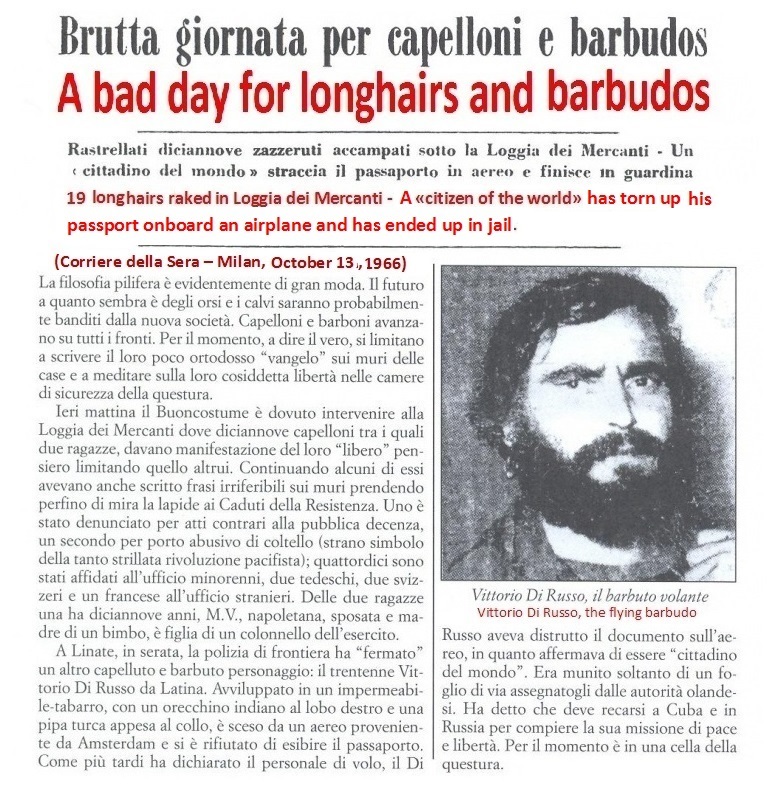
(from Corriere della Sera) Vittorio Di Russo deported from Amsterdam to Milan.
Following the publication of this article in Corriere della Sera, Vittorio Di Russo's photo bounced from one newspaper to another and hundreds of thousands of people read about the imaginative destruction of his passport on the plane. Vittorio Di Russo, until then unknown, immediately became a famous person.
Melchiorre Gerbino, who was in Milan, after reading of Vittorio Di Russo's arrival, started looking for him and met him in the center of the city, in Piazza Duomo, where he was together with a dozen longhairs, those who were used to wandering there, as he had already catalyzed them all around his person.
Vittorio Di Russo and Melchiorre Gerbino were linked by a friendship that dated back to the early 1960s, when they frequented the same existentialist milieu in Gamla Stan, Stockholm's old town. When they met again in Milan, they looked into each other's eyes and nodded, and two days later they founded the Mondo Beat Movement. In the meantime, Vittorio Di Russo had been able to come into contact with Giuseppe Pinelli and the anarchists, Pietro Stoppani and the radicals, Carlo Masi and some university students, and had also attracted young people who ran away from home and wandered through the city centre.
(AGI - Il Giorno)
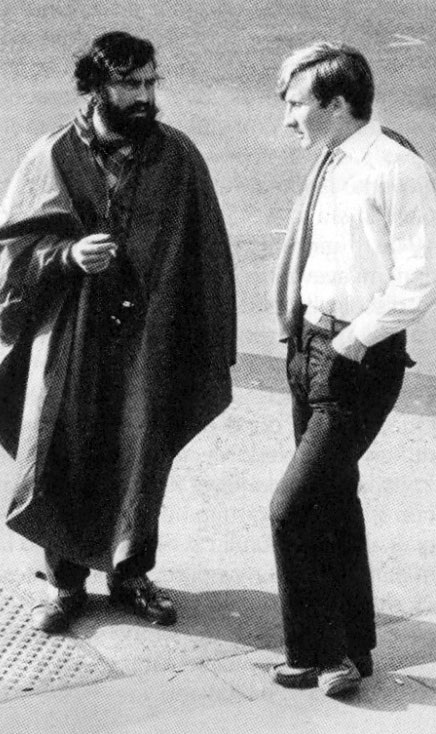
Vittorio Di Russo
Vittorio Di Russo was born in Scauri di Minturno (Lazio) on 12 August 1936.
He joined the Navy at age 16, but deserted two years later. He entered Corsica illegally, where he lived for a few months in the rugged mountains. He eventually obtained a regular Italian passport and traveled to many European countries.
Vittorio Di Russo had the charisma of a leader, but at times he was impulsive and dragged himself and others into critical situations, but if called to the dictates of Reason he conformed to them, being a sincere person and a true anarchist.
He was a sculptor. He spoke fluent Italian, French and German. He expressed himself concisely and directly.
Umberto Tiboni
Who did not know who Umberto Tiboni was, seeing him could not imagine that he was one of the most radical characters of the Contestation. He did his utmost to not appear as a central figure of the Mondo Beat Movement. He did not give speeches in the Mondo Beat premises, he dressed casually, was so discreet that no photojournalist was able to capture him with a shot. As it is almost impossible to find images of him in publications of the time, many who have written about the history of Mondo Beat have treated him as an insignificant character, some did not even mention him. But Umberto Tiboni was a central character in the history of Mondo Beat, since his part was determinant in all decisions taken along the path of the Mondo Beat Movement.
Umberto Tiboni managed the Cava, the official seat of the Mondo Beat Movement. The Cava had underground structures which made it appealing, so much that it became the heart of the youth revolt in Italy. Umberto Tiboni's management of the Cava was flawlessly, and this was not an easy task, being the Cava open 24 hours, accessible for free to anyone without obligation of identification.
(Agenzia Franco Sapi)
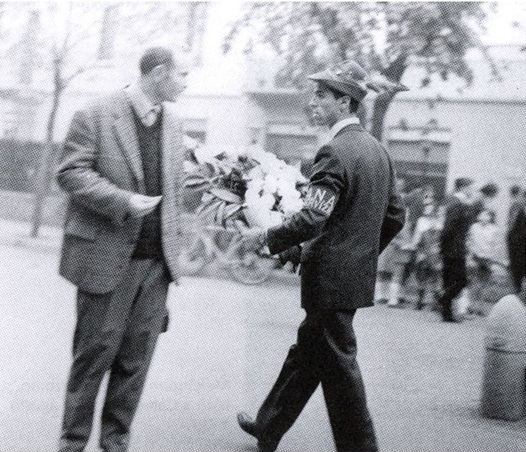
Umberto Tiboni.
Umberto Tiboni was born in Sesto San Giovanni (Lombardy) on February 19, 1941.
He had a weakness for boys and girls who ran away from their families, perhaps he would have liked to do the same in his early youth, so he had made his small apartment in Cinisello Balsamo available to them and, to accommodate as many as possible and make them feel free from any obligation, he had moved at his mother's.
Umberto Tiboni understood English and French quite well, but since he had not yet traveled much, he spoke only Italian fluently. He was a licensed industrial expert.
Melchiorre Paolo Gerbino
Melchiorre Gerbino's personal story is so intrinsic to the history of Mondo Beat that they cannot be extrapolated from each other. He structured and directed the magazine Mondo Beat. He was the leader of the demonstrations of the Mondo Beat Movement and since the first ones were not authorized he had to face the police. He was the creator of a tent city, the so-called Barbonia City, where a sexual revolution was triggered that changed the way of life in Italy.
Since Melchiorre Gerbino never denied his past but continued to be consistent with it, he has been slandered and belittled. This was done in the films ("The Prophet" and "Satyricon"); in the books ("Underground: a pugno chiuso!" and "I Viaggi di Mel") and has been persecuted by the judiciary, and the secret services have attempted to kill him several times. All this because the Vatican wants any reference to the history of Mondo Beat to be dispersed, fearing that young people could draw inspiration from it and raise new waves of Contestation.
(Agenzia Franco Sapi)
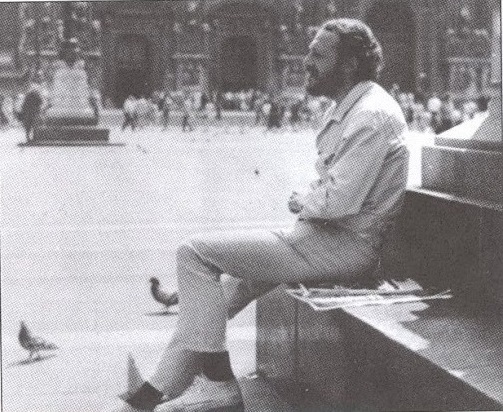
Melchiorre Gerbino
Melchiorre Gerbino was born in Calatafimi (Sicily) on August 30, 1939.
In 1961, when in Sweden, the first girl he made love to, called him by someone else's name, "Paolo". As in those days he was an existentialist, he kept the name Paolo and Vittorio Di Russo knew him by this name. When in 1966 they met again in Milan, the first thing Vittorio said was "Paolo!" and consequently Melchiorre Gerbino would have been called Paolo also at the time of Mondo Beat.
Before the founding of the Mondo Beat Movement, he had been 5 years on the road. He spoke Italian, French and Swedish fluently, English and Spanish sufficiently. At school he had studied Latin and ancient Greek.
Gunilla Unger
Gunilla Unger and Melchiorre Gerbino met in a club in Gamla Stan, Stockholm's Old Town, the day she turned 18. He was 23 and had already lived in Stockholm for two years.
In the early Sixties, there were underground premises in Gamla Stan frequented by young travelers from various countries, among them the first globetrotters, and by Swedish girls who were fluent in at least three languages. Located not far from the Royal Palace, these cellars had been barns and attics of noble families in the Middle Ages.
To enter these cellars, you had to pay very little money and to drink a Coke you had to go out and look for a vending machine. There people danced jazz, sometimes live, when African American musicians came to play, as they liked the acoustics of these cellars. Some of those musicians were famous, but they performed incognito and for free, as they enjoyed their stay in Sweden, where they did not suffer racist opposition if they were in the company of white women.
As it is understandable, the milieu of these cellars was original. It could happen that two girls sat on your legs and while you kissed a little the one and a little the other, you were also listening to a young Australian professor of history of philosophy, who had hitchhiked all the way from Singapore to Stockholm, who gave you information about places of the world which you had not yet visited. In this milieu, Melchiorre Gerbino and Gunilla Unger had spent a couple of years before the founding of Mondo Beat.
Due to the Provo imprinting which Vittorio Di Russo gave it, Mondo Beat was kept under pressure by secret services, police and carabinieri (federal police) from the very beginning. Police and carabinieri often raked up boys and girls who used to meet in Piazza Duomo and in the underpasses of Cordusio metro station. Youths arrested in the raids, if they had not a registered residence in Milan, were subjected to a mandatory expulsion order and an injunction to stay away from Milan for 5 years. If they didn't comply with the injunctions and were arrested in Milan again, they were sentenced to one month in prison; if repeat offenders, to three months; then to six months... This situation created a state of tension in the group, from which we freed ourselves at night, when we met at the owners of large houses, where we partied and relaxed. In one of these parties, one of the first, Gunilla Unger was sitting on one leg of Melchiorre Gerbino and on the other Carmen Russo, when suddenly all the boys and girls undressed and participated in a sort of group sex , not ostentatious or vulgar, which Carmen Russo, Gunilla Unger and Melchiorre Gerbino watched with due detachment.
Surely if Gunilla Unger, who was Melchiorre Gerbino's wife, had been jealous of Carmen Russo and angrily moved away from his leg, Melchiorre Gerbino would not have written the story of Mondo Beat, because Mondo Beat would not have existed, given that it was characterized by the sexual spontaneity which characterizes true revolutions. In a time when machismo habits raged in Italy, there was not a single episode of jealousy at Mondo Beat, which sounds incredible, considering the intertwining of hundreds of human situations and the fact that no one was ever requested for identification. Surely, without Gunilla Unger, who was the reference for the first girls who joined Mondo Beat, the Movement would not have characterized by that kind of Scandinavian fair play which somehow would have connoted it. Nor, without the sexual brotherhood that united them, the youths of Mondo Beat would have been able to stage public events that paralyzed the center of Milan, during which they risked ending up on a stretcher with two broken ribs by the police.
Gunilla Unger was not present at the Crota Piemunteisa tavern on the occasion of the founding of the Movement, but her personality was so fundamental in the history of Mondo Beat, that she must inevitably be counted among the founders.
(AGI - Il Giorno)
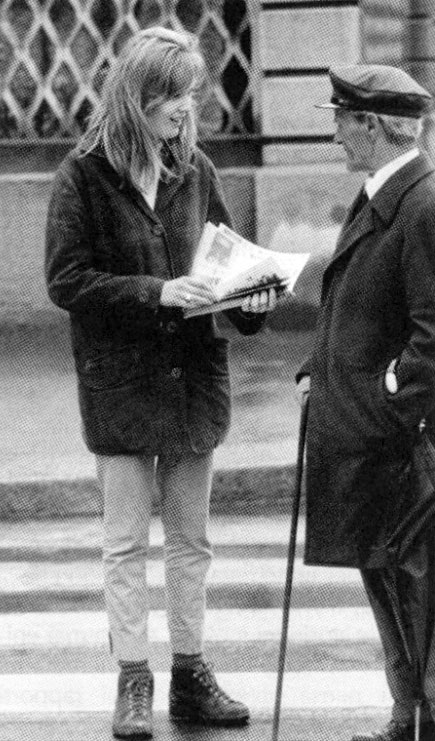
Gunilla Unger
Gunilla Unger was born in Solna (Stockholm - Sweden) on March 10, 1945.
Gunilla Unger and Melchiorre Gerbino were married at Stockholm City Hall in April 1965, when their son Nino was 4 months old. They married because they had decided to go to Italy, where a Christian-Democratic government, a Vatican political creature, had enacted a law prohibiting unmarried couples from sharing hotel rooms.
At the time of Mondo Beat, Gunilla Unger spoke Swedish, Italian, English, French and German. A graduate of the Swedish high school, classical line, she knew Latin.
The founding of the Mondo Beat Movement.
On the afternoon of October 15, 1966, six people met at the Crota Piemunteisa via Pontaccio, a tavern a few steps from Brera's Picture Gallery. Crota Piemunteisa was an original tavern, because in addition to the rooms on the ground floor, it had a loft where you felt like you were on the stage of a theater.
The six sat at a table in the loft and ordered hard-boiled eggs and "Oltrepò Pavese" red wine. They were Melchiorre Gerbino, Vittorio Di Russo and four others who had come together with Vittorio. The purpose of the meeting was the founding of a movement, but as soon as Vittorio Di Russo and Melchiorre Gerbino started talking about the anarchist nature of this movement, three of the four who had come with Vittorio Di Russo left, adducing various excuses. Of the four only Umberto Tiboni remained.
Thus Vittorio Di Russo, Melchiorre Gerbino and Umberto Tiboni discussed the name and the structures to give to the movement.
Find the name was laborious, as the term "Provo", which they would have liked to adopt, could not be taken by them, because it was already taken by a group of students associated with the anarchist section "Sacco e Vanzetti".
Vittorio Di Russo wished that the term "Beat" appeared in the name of the movement, but Melchiorre Gerbino was critical about this term, because it would have reminded the Beat Generation, a generation older than theirs, while it would have been appropriate to find a term who referred to the Free Speech Movement. But Vittorio Di Russo insisted on the term "Beat". At one point, Melchiorre Gerbino had the inspiration to put the term "Mondo" (world) before "Beat" and finally all the three liked the formula, so the movement was named "Mondo Beat".
Then they have considered which structures to give to the movement and decided to have a magazine and a venue. They easily decided to call the magazine by the same name as the movement, "Mondo Beat", and they agreed they would have solicited support from the Sacco e Vanzetti anarchists before having their own seat.
Finally, they decided that Vittorio Di Russo would lead the movement at public events and would maintain contact between Mondo Beat and the other extra-parliamentary groups; Melchiorre Gerbino would be the editor of the magazine and the ideologue of the movement; Umberto Tiboni the administrator and the treasurer.




